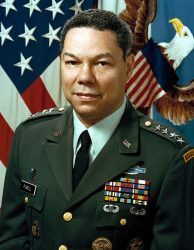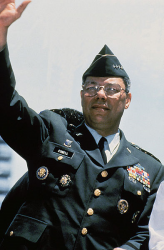
 |
|
|
||
|
Colin Luther Powell |
||||
|
Engagements: • Vietnam War (1960 - 1973)• Gulf War (1990 - 1991) |
||||
| Biography: | ||||
|
Colin Luther Powell The Early Years Colin Luther Powell was born on 5 April 1937 in Harlem, a neighborhood in the New York City borough of Manhattan. He was born to Jamaican immigrant parents Luther Theophilus and Maud Arial McKoy Powell. He also has Scottish ancestry. Powell was raised in the South Bronx and attended Morris High School, a former public school in the Bronx, from which he graduated in 1954. While at school, he worked at a local baby furniture store where he picked up Yiddish from the shopkeepers and some of the customers. He received his Bachelor of Science degree in Geology from the City College of New York in 1958 and was a self-admitted 'C-average' student. He was later able to earn a Master of Business Administration degree from George Washington University in 1971, after his second tour in Vietnam. Military Career Powell described joining the Reserve Officers' Training Corps (ROTC) during college as one of the happiest experiences of his life. Discovering something he loved and could do well, he felt he had "found himself." Cadet Powell joined the Pershing Rifles, the ROTC fraternal organization and drill team begun by General John Pershing. Even after he had become a General, Powell kept on his desk a pen set he had won for a drill team competition. Upon graduation, he received a commission as an Army Second Lieutenant on 9 June 1958. He was a professional soldier for 35 years, holding a variety of command and staff positions and rising to the rank of General. Powell was a Captain during the Vietnam War, serving as a South Vietnamese Army advisor from 1962-63. While on patrol in a Viet Cong-held area, he was wounded by stepping on a Punji stake. He returned to Vietnam as a Major in 1968, serving in the Americal Division (23rd Infantry Division), then as Assistant Chief of Staff of Operations for the Americal Division. He was charged with investigating a detailed letter by Tom Glen (a soldier from the 11th Light Infantry Brigade), which backed up rumored allegations of the My Lai Massacre. Powell wrote: "In direct refutation of this portrayal is the fact that relations between American soldiers and the Vietnamese people are excellent." Later, Powell's assessment would be described as whitewashing the news of the massacre, and questions would continue to remain undisclosed to the public. In May 2004, Powell said to Larry King, "I mean, I was in a unit that was responsible for My Lai. I got there after My Lai happened. So, in war, these sorts of horrible things happen every now and again, but they are still to be deplored." Powell served a White House fellowship, a highly selective and prestigious position, under President Richard Nixon from 1972-73. In his autobiography, My American Journey, Powell named several officers he served under that inspired and mentored him. As a Lieutenant Colonel serving in South Korea, Powell was very close to General Henry "Gunfighter" Emerson. Powell said he regarded Emerson as one of the most caring officers he ever met. Emerson was reputedly eccentric; he insisted his troops train only at night and made them repeatedly watch the television film Brian's Song to promote racial harmony. Powell always professed, however, that what set Emerson apart was his great love of his soldiers and concern for their welfare. In the early 1980s, Powell served at Fort Carson, CO. After he left Fort Carson, Powell became Senior Military Assistant to Secretary of Defense Caspar Weinberger, whom he assisted during the 1983 invasion of Grenada and the 1986 airstrike on Libya. In 1986, he took over the command of V Corps in Frankfurt, Germany, from Robert Lewis "Sam" Wetzel. National Security Advisor Following the Iran Contra scandal, Powell became Ronald Reagan's National Security Advisor at the age of 49. He served from 1987-89 while retaining his Army commission as a Lieutenant General. Back in Uniform After his tenure with the National Security Council, Powell was promoted to four-star General under President George H.W. Bush and briefly served as Commander-in-Chief (CINC) of the Army's Forces Command (FORSCOM), overseeing all Army, Army Reserve, and National Guard units in the Continental U.S., Alaska, Hawaii, and Puerto Rico. FORSCOM was headquartered at Fort McPherson, GA. Later that year, President George H.W. Bush selected him as Chairman of the Joint Chiefs of Staff. Chairman of the Joint Chiefs of Staff Powell's last military assignment, from 1 October 1989 to 30 September 1993, was as the 12th Chairman of the Joint Chiefs of Staff, the highest military position in the Department of Defense. At age 52, he became the youngest officer, and first Afro-Caribbean American, to serve in this position. In 1989, he joined Dwight D. Eisenhower and Alexander Haig as the third general since World War II to reach four-star rank without ever being a divisional commander. During his chairmanship of the JCS, there was discussion of awarding Powell a fifth star, granting him the rank of General of the Army. But even in the wake of public and Congressional pressure to do so, Clinton-Gore presidential transition team staffers decided against it. During his tenure, he oversaw 28 crises, including the invasion of Panama in 1989 to remove General Manuel Noriega from power and Operation Desert Storm in the 1991 Persian Gulf War. During these events, Powell earned his nickname, "the reluctant warrior." He rarely advocated military intervention as the first solution to an international crisis, and instead usually prescribed diplomacy and containment. In his autobiography, Powell said he is haunted by the nightmare of the Vietnam War and felt that the leadership was very ineffective. Powell served a tour in Vietnam as a military advisor, and was mildly injured when he stepped on a bamboo "punji stick." The large infection made it difficult for him to walk, and caused his foot to swell for a short time, shortening his first tour. It was also during his Vietnam service, his second tour, that Powell was decorated for bravery. He single-handedly rescued several men from a burning helicopter, one of them being Maj. Gen. Charles Gettys, the commander of the Americal Division. Additionally, Powell has been critical of other instances of U.S. foreign policy in the past, such as its support for the 1973 Chilean coup d'état. From two separate interviews in 2003, Powell stated in one about the 1973 event "I can't justify or explain the actions and decisions that were made at that time. It was a different time. There was a great deal of concern about communism in this part of the world. Communism was a threat to the democracies in this part of the world. It was a threat to the United States." In another interview, however, he also simply stated "With respect to your earlier comment about Chile in the 1970s and what happened with Mr. Allende, it is not a part of American history that we're proud of." As a military strategist, Powell has advocated an approach to military conflicts that maximizes the potential for success and minimizes casualties. A component of this approach is the use of overwhelming force, which he applied to Operation Desert Storm in 1991. His approach has been dubbed the "Powell Doctrine." General Powell retired from active military service in 1993. Dates of Rank Second Lieutenant: 9 June 1958 Medals, Awards, Badges & Tabs Defense Distinguished Service Medal with 3 Bronze Oak Leaf ClustersArmy Distinguished Service Medal with Bronze Oak Leaf Cluster Air Force Distinguished Service Medal Coast Guard Distinguished Service Medal Navy Distinguished Service Medal Defense Superior Service Medal Legion of Merit with Bronze Oak Leaf Cluster Soldier's Medal Bronze Star Medal Purple Heart Air Medal Joint Service Commendation Medal Army Commendation Medal with 2 Bronze Oak Leaf Clusters National Defense Service Medal with Bronze Star Vietnam Service Medal with Silver Star Army Service Ribbon Army Overseas Service Ribbon with Award Numeral 4 Vietnam Campaign Medal Vietnam Gallantry Cross Unit Citation Combat Infantryman Badge Expert Infantryman Badge Parachutist Badge Pathfinder Badge Air Assault Badge Ranger Tab Presidential Service Badge Secretary of Defense Identification Badge Joint Chiefs of Staff Identification Badge Army Staff Identification Badge Foreign Medals and Awards Skanderbeg's Order (Albania) Soldier's Medal Citation The President of the United States of America, authorized by Act of Congress, July 2, 1926, takes pleasure in presenting the Soldier's Medal to Major Colin Luther Powell, United States Army, for heroism not involving actual conflict with an armed enemy in the Republic of Vietnam. Major Powell distinguished himself by valorous actions on 16 November 1968, while serving as G-3 Americal Division. On that date, the helicopter in which Major Powell was being transported with the Commanding General, Americal Division, crashed. With complete disregard for his own safety and while injured himself, Major Powell returned several times to the smoldering aircraft which was in danger of bursting into flames. In one instance he had to break away part of the wreckage in order to get to a trapped individual. Through his efforts all personnel were saved. Major Powell's personal bravery and devotion to duty are in keeping with the highest traditions of the military service and reflect great credit upon himself, the Americal Division, and the United States Army. General Orders: Headquarters, Americal Division, General Orders No. 9285 (December 3, 1968) Personal Colin Luther Powell married Alma Johnson on 25 August 1962. Their son, Michael Powell, was the chairman of the Federal Communications Commission (FCC) from 2001 to 2005. As a hobby, General Powell restores old Volvo and Saab cars. [For information on Colin Luther Powell's service as Secretary of State, his political views and criticisms, civilian awards and honors, etc. please see Wikipedia at http://en.wikipedia.org/wiki/Colin_Powell.] |
||||
| Honoree ID: 307 | Created by: MHOH | |||
Ribbons
Medals
Badges
Honoree Photos
 |  |  |
 |  |
 |


